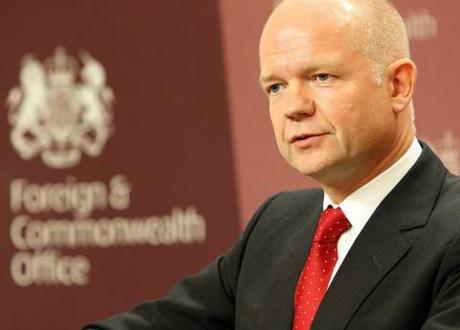
William Hague, Foreign Secretary. Photocredit Foreign and Commonwealth Office http://www.flickr.com/photos/foreignoffice/5980540453/sizes/z/in/photostream/
The foreign secretary, William Hague, has said that the six months of progress gained during the uprisings in North Africa and the Middle East, known as the Arab Spring, risk being for nothing, taken off the rails by faltering economies, sectarian feuds and counter-revolutions. Whilst insisting that we remain on the optimistic side, he warned particularly about Egypt, and also predicted ‘a lot of problems and even convulsions’ for years to come. This comes on the heels of his expulsion of Libyan diplomats from London and his recognition of the Libyan National Transition Council. As these fledgling revolutions enter into stalemates, what is the future for democracy in the “4,000 mile arc of instability” that runs “from Morocco to Oman“?
- The West has a crucial role. First Tunisia’s President Ben Ali fled, said The Times leader, then 50,000 protestors forced President Mubarak out of Egypt. But far from the successive collapse of despots, we have seen other countries in the region responding with force. Colonel Gaddafi in Libya, as well as the governments in Bahrain and Syria have unleashed fury: “What the world has seen is not a revolution but a series of revolts.” Now it’s not at all clear who’s in charge, or even if any real changes are in motion. Though January’s optimism is “fading fast”, we “Western nations are not bystanders.” If the colossal human rights violations of the Arab world are not seen to, the West “will feel the backlash of frustrated hopes”, with thousands of refugees, a rise in Islamist extremism and a threat to global energy supplies. The future lies with Egypt and Libya, where the West has a crucial role. Egypt must continue to look to the US; Gadaffi must go. “Even when he is gone, it may be some years before the gentle breeze of democracy blows again. But it will, one day.”
“We mustn’t expect each country to be neatly done in six months. It’s not a computer game that comes to an end when you get bored.” William Hague, Foreign Secretary.
- The best thing that’s happened in a generation? The Arab Spring is “about power,” said Adrian Hamilton in The Independent. Western intervention doesn’t work – look at Iraq and Afghanistan. The best policy is “discreet observation.” Our best weapons are economic: what we can do is offer assistance, “open markets and freedom of movement”. European politicians won’t accept this, but think about it: the Arab Spring “could be the best thing to have happened to Europe in a generation”, bringing “economic renaissance” to North Africa and Southern Europe. “It’s time for a bigness of response not a quibbling over the future of Colonel Gaddafi, however unpleasant a man he may be.”
- What about Israel? Israel has stepped into the fray, reported M K Bhadrakumar on The Asia Times, calling for regime change in Damascus. For Israel to make a stand over Syria is “a path-breaking performance.” Regime change anywhere in the Arab world can only work against Israel’s interests. Consider Egypt, which will have to factor in the desire of its people to distance itself from Israel and the US. Israel is watching “with trepidation” the loosening of relations between Egypt and Iran. The country is hoping for a negotiated solution, and is “disheartened” at the sight of no concerted international action.
- Meanwhile, is Algeria immune from the Arab Spring? asked Hamoud Salhi on BBC News. Whilst President Bouteflika is appeasing the populace with pay increases and tax waivers, and has launched a program of reform including an amended constitution, the people’s anger will not remain hidden for long. Again, the economy is key: if current conditions continue, ”the population will have no choice but to turn to the inevitable: Revolution. Only time will tell if the Algerian government has saved Algeria and itself from any radical change.”

